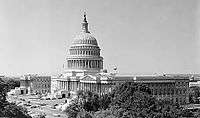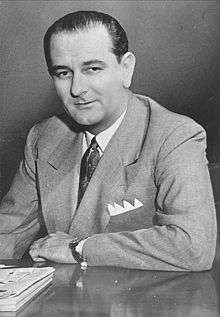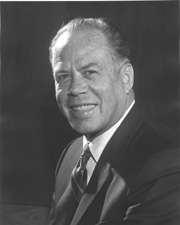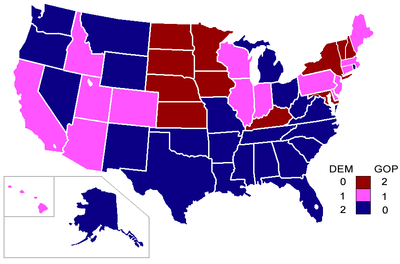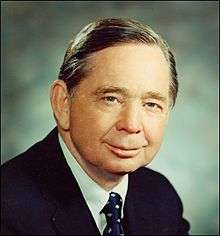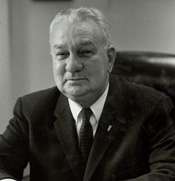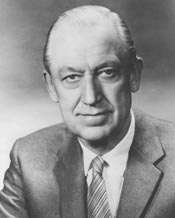86th United States Congress
| 86th United States Congress | |||||||||||||||||||||||||||||
| |||||||||||||||||||||||||||||
The Eighty-sixth United States Congress was a meeting of the legislative branch of the United States federal government, composed of the United States Senate and the United States House of Representatives. It met in Washington, D.C. from January 3, 1959 to January 3, 1961, during the last two years of the presidency of Dwight D. Eisenhower. The apportionment of seats in the House of Representatives was based on the Seventeenth Census of the United States in 1950. Both chambers had a Democratic majority. When Alaska and Hawaii were admitted as states in 1959, the membership of the House temporarily increased to 437 (seating one member from each of those newly admitted states and leaving the apportionment of the other 435 seats unchanged); it would remain at 437 until reapportionment resulting from the 1960 census.
Major events
- January 7, 1959: The United States recognizes the new Cuban government of Fidel Castro
- February 12, 1959: In commemorations of the 150th anniversary of Abraham Lincoln's birth, Congress met in joint session to hear actor Fredric March give a dramatic reading of the Gettysburg Address, followed with an address by writer Carl Sandburg[1]
- February 1, 1960: Greensboro sit-ins begin
- May 1, 1960: U-2 incident
- June 29, 1960: King Bhumibol Adulyadej of Thailand addresses a Joint Meeting of Congress
- November 8, 1960: United States presidential election, 1960
Major legislation
- 1959: Airport Construction Act, Pub.L. 86–72
- September 14, 1959: Landrum–Griffin Act, Pub.L. 86–257, 73 Stat. 519
- May 6, 1960: Civil Rights Act of 1960, Pub.L. 86–449
- July 14, 1960: Flood Control Act of 1960, Pub.L. 86–845, 74 Stat. 488
- September 13, 1960: Social Security Amendments (Kerr-Mill aid), Pub.L. 86–778, 74 Stat. 976
- 1960: Sustained Yield Act of 1960
Treaties
- December 1, 1959: Antarctic Treaty signed
- January 19, 1960: Treaty of Mutual Cooperation and Security between the United States and Japan signed
Constitutional amendment
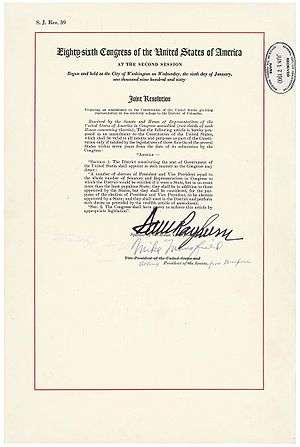
- June 17, 1960: The Twenty-third Amendment to the United States Constitution passed Congress, which would allow residents of Washington, D.C. to vote in presidential elections. It would be ratified by the states in the next Congress.
States admitted
- January 3, 1959: Alaska was admitted as the 49th state.
- August 21, 1959: Hawaii was admitted as the 50th state.
Party summaries
Senate
- Democratic: 64 (majority), then 65
- Republican: 34, then 35
TOTAL members: 98, then 100
House of Representatives
- Democratic: 283 (majority)
- Republican: 153
- Independent: 1
TOTAL members: 437. The increase over the usual 435 members was due to the admission of Alaska and Hawaii, whose seats were temporary until reapportionment following the 1960 Census.
Leadership

Richard Nixon (R)
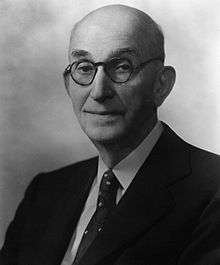
Carl Hayden

Sam Rayburn
Senate
Majority (Democratic) leadership
Minority (Republican) leadership
House of Representatives
- Speaker: Sam Rayburn (D)
Majority (Democratic) leadership
Minority (Republican) leadership
Caucuses
Members
Senate
Senators are popularly elected statewide every two years, with one-third beginning new six-year terms with each Congress. Preceding the names in the list below are Senate class numbers, which indicate the cycle of their election.
House of Representatives
The names of members of the House of Representatives are preceded by their district numbers.
Changes in membership
Senate
| State (class) |
Vacator | Reason for change | Successor | Date of successor's formal installation |
|---|---|---|---|---|
| Hawaii (1) |
New seats | Hawaii achieved statehood August 21, 1959. | Hiram Fong (R) | August 21, 1959 |
| Hawaii (3) |
Oren E. Long (D) | |||
| North Dakota (1) |
William Langer (R) | Died November 8, 1959 | Clarence N. Brunsdale (R) | November 19, 1959 |
| Oregon (2) |
Richard L. Neuberger (D) | Died March 9, 1960 | Hall S. Lusk (D) | March 16, 1960 |
| North Dakota (1) |
Clarence N. Brunsdale (R) | Successor elected August 7, 1960. | Quentin N. Burdick (D) | August 8, 1960 |
| Missouri (3) |
Thomas C. Hennings, Jr. (D) | Died September 13, 1960 | Edward V. Long (D) | September 23, 1960 |
| Oregon (2) |
Hall S. Lusk (D) | Successor elected November 8, 1960 | Maurine Brown Neuberger (D) | November 9, 1960 |
| Massachusetts (1) |
John F. Kennedy (D) | Resigned December 22, 1960 after being elected President of the United States | Benjamin A. Smith II (D) | December 27, 1960 |
House of Representatives
| District | Vacator | Reason for change | Successor | Date successor seated |
|---|---|---|---|---|
| Missouri 4th | George H. Christopher (D) | Died January 23, 1959 | William J. Randall (D) | March 3, 1959 |
| New York 43rd | Daniel A. Reed (R) | Died February 19, 1959 | Charles Goodell (R) | May 26, 1959 |
| Ohio 6th | James G. Polk (D) | Died April 28, 1959 | Ward Miller (R) | November 8, 1960 |
| Hawaii Territory At-large | John A. Burns (D) | Hawaii achieved statehood. | Seat eliminated August 21, 1959 | |
| Hawaii At-large | New seat | Hawaii achieved statehood August 21, 1959 | Daniel Inouye (D) | August 21, 1959 |
| Illinois 12th | Charles A. Boyle (D) | Died November 4, 1959 | Vacant | Not filled this term |
| Iowa 4th | Steven V. Carter (D) | Died November 4, 1959 | John H. Kyl (R) | December 15, 1959 |
| Pennsylvania 17th | Alvin Bush (R) | Died November 5, 1959 | Herman T. Schneebeli (R) | April 26, 1960 |
| New York 23rd | Isidore Dollinger (D) | Resigned December 31, 1959 | Jacob H. Gilbert (D) | March 8, 1960 |
| Pennsylvania 18th | Richard M. Simpson (R) | Died January 7, 1960 | Douglas H. Elliott (R) | April 26, 1960 |
| North Carolina 12th | David M. Hall (D) | Died January 29, 1960 | Roy A. Taylor (D) | June 25, 1960 |
| Washington 3rd | Russell V. Mack (R) | Died March 28, 1960 | Julia Butler Hansen (D) | November 8, 1960 |
| Pennsylvania 18th | Douglas H. Elliott (R) | Died June 19, 1960 | J. Irving Whalley (R) | November 8, 1960 |
| North Dakota At-large | Quentin N. Burdick (D) | Resigned August 8, 1960 after becoming US Senator | Vacant | Not filled this term |
| Massachusetts 5th | Edith Nourse Rogers (R) | Died September 10, 1960 | Vacant | Not filled this term |
| Wyoming At-large | Edwin K. Thomson (R) | Died December 9, 1960 | Vacant | Not filled this term |
| New York 5th | Albert H. Bosch (R) | Resigned December 31, 1960 after being elected judge of Court of Queens County | Vacant | Not filled this term |
Committees
Lists of committees and their party leaders.
Senate
- Aeronautical and Space Sciences
- Agriculture and Forestry
- Appropriations
- Banking and Currency
- District of Columbia
- Finance
- Foreign Relations
- Government Operations
- Interior and Insular Affairs
- Interstate and Foreign Commerce
- Judiciary
- Labor-Management Relations (Select)
- Labor and Public Welfare
- National Water Resources (Select)
- Preserve Historical Records of the Senate (Special)
- Post Office and Civil Service
- Public Works
- Small Business (Select)
- Space and Aeronautics (Special)
- Subcommittee on Internal Security
- Unemployment Problems (Special)
- Whole
House of Representatives
- Agriculture
- Appropriations
- Banking and Currency
- District of Columbia
- Education and Labor
- Foreign Affairs
- Government Operations
- House Administration
- Interior and Insular Affairs
- Merchant Marine and Fisheries
- Post Office and Civil Service
- Public Works
- Rules
- Science and Astronautics
- Small Business (Select)
- Standards of Official Conduct
- Un-American Activities
- Veterans' Affairs
- Ways and Means
- Whole
Joint committees
- Atomic Energy
- Conditions of Indian Tribes (Special)
- Construction of a Building for a Museum of History and Technology for the Smithsonian
- Defense Production
- Disposition of Executive Papers
- Economic
- Immigration and Nationality Policy
- Legislative Budget
- The Library
- Navajo-Hopi Indian Administration
- Printing
- Reduction of Nonessential Federal Expenditures
- Taxation
- Washington (DC) Metropolitan Problems
Employees and legislative agency directors
Legislative branch agency directors
- Architect of the Capitol: J. George Stewart
- Attending Physician of the United States Congress: George Calver
- Comptroller General of the United States: Joseph Campbell
- Librarian of Congress: Lawrence Quincy Mumford
- Public Printer of the United States: Raymond Blattenberger
Senate
- Chaplain: Frederick Brown Harris, Methodist
- Parliamentarian: Charles Watkins
- Secretary: Felton McLellan Johnston
- Sergeant at Arms: Joseph C. Duke
House of Representatives
- Clerk: Ralph R. Roberts
- Doorkeeper: William Mosley "Fishbait" Miller
- Parliamentarian: Lewis Deschler
- Postmaster: H. H. Morris
- Sergeant at Arms: Zeake W. Johnson, Jr.
- Chaplain: Bernard Braskamp - Presbyterian
See also
- United States elections, 1958 (elections leading to this Congress)
- United States elections, 1960 (elections during this Congress, leading to the next Congress)
References
- Specific citations
- ↑ "Nation Honor Lincoln On Sesquicentennial" (PDF). Yonkers Herald-Statesman. Northern Illinois University Libraries. Associated Press. February 11, 1959. Retrieved April 25, 2013.
Congress gets into the act tomorrow, when a joint session will be held. Carl Sandburg, famed Lincoln biographer, will give and address, and actor Fredric March will read the Gettysburg Address.
- General references
- Gould, Lewis L. (2005). The Most Exclusive Club. Cambridge, MA: Perseus Books Group. ISBN 0-465-02778-4.
- Remini, Robert V. (2006). The House. New York: HarperCollins Publishers, Inc. ISBN 0-06-088434-7.
- "Biographical Directory of the U.S. Congress". U.S. Congress. 2005. Archived from the original on June 1, 2006. Retrieved June 1, 2006.
- "Congressional History". U.S. House of Representatives. 2006. Archived from the original on June 1, 2006. Retrieved June 1, 2006.
- "Statistics and Lists". U.S. Senate. 2006. Archived from the original on June 1, 2006. Retrieved June 1, 2006.
- House of Representatives Session Calendar for the 86th Congress (PDF).
- Official Congressional Directory for the 86th Congress, 1st Session.
- Official Congressional Directory for the 86th Congress, 2nd Session.
- Pocket Congressional Directory for the 86th Congress.
